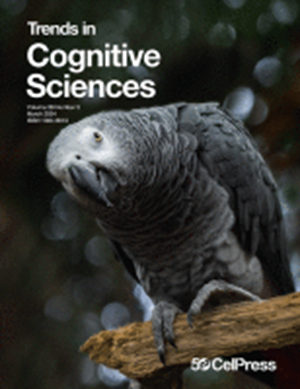Tracking minds in communication.
IF 17.2
1区 心理学
Q1 BEHAVIORAL SCIENCES
Trends in Cognitive Sciences
Pub Date : 2025-03-01
Epub Date: 2024-12-17
DOI:10.1016/j.tics.2024.11.005
引用次数: 0
Abstract
How does social cognition help us communicate through language? At what levels does this interaction occur? In classical views, social cognition is independent of language, and integrating the two can be slow, effortful, and error-prone. But new research into word level processes reveals that communication is brimming with social micro-processes that happen in real time, guiding even the simplest choices like how we use adjectives, articles, and demonstratives. We interpret these findings in the context of advances in theoretical models of social cognition and propose a communicative mind-tracking framework, where social micro-processes are not a secondary process in how we use language - they are fundamental to how communication works.
追踪交流中的思想。
社会认知是如何帮助我们通过语言进行交流的?这种相互作用发生在什么层次上?在经典观点中,社会认知是独立于语言的,将两者结合起来可能是缓慢、费力且容易出错的。但一项对词汇层面过程的新研究表明,交流中充满了实时发生的社会微过程,甚至指导着我们如何使用形容词、冠词和指示词等最简单的选择。我们在社会认知理论模型进步的背景下解释了这些发现,并提出了一个交际思维追踪框架,其中社会微过程不是我们如何使用语言的次要过程-它们是沟通如何工作的基础。
本文章由计算机程序翻译,如有差异,请以英文原文为准。
求助全文
约1分钟内获得全文
求助全文
来源期刊

Trends in Cognitive Sciences
医学-行为科学
CiteScore
27.90
自引率
1.50%
发文量
156
审稿时长
6-12 weeks
期刊介绍:
Essential reading for those working directly in the cognitive sciences or in related specialist areas, Trends in Cognitive Sciences provides an instant overview of current thinking for scientists, students and teachers who want to keep up with the latest developments in the cognitive sciences. The journal brings together research in psychology, artificial intelligence, linguistics, philosophy, computer science and neuroscience. Trends in Cognitive Sciences provides a platform for the interaction of these disciplines and the evolution of cognitive science as an independent field of study.
 求助内容:
求助内容: 应助结果提醒方式:
应助结果提醒方式:


